Despite scrutiny and drama with DOJ, Missouri's midterm went off (mostly) without a hitch
Missouri entered election season with a lot on the line: a new U.S. senator and congressional seats on the ballot, several statewide ballot measures and new laws governing how voting and elections work in the state.
Everything appears to have largely gone according to plan in the Show-Me State.
How many people voted in Missouri's midterm election?
Just over 2 million Missourians cast ballots, according to early unofficial totals, and the state's top elections official praised county clerks, poll workers and voters for administering and participating in a key midterm election that had no "major issues."
"Once again, I think Missouri showed how it can be done well, and how we can get results quickly," Secretary of State Jay Ashcroft said in an interview Monday.
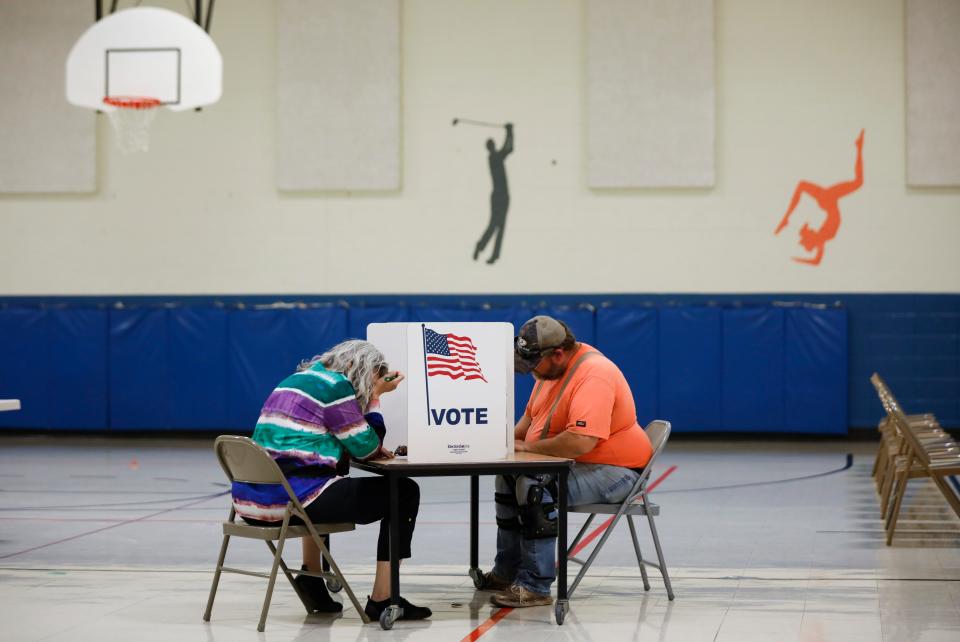
Preliminary vote totals project turnout to be down compared to 2018, the last midterm election ― Ashcroft estimated it would end just under 50% this year, compared to just over 58% in 2018. He attributed that in part to less national attention and spending at the top of the ballot, in a Missouri the Republican Party has come to dominate on a statewide level.
"I still want to encourage people to vote," Ashcroft said. "But I think you could make the argument that the vast majority of races in Missouri were decided in August, and unfortunately, I think that caused people to stay home."
Those that did turn out, he said, largely experienced few if any issues casting their ballots — Ashcroft lauded county clerks and poll workers who kept things running smoothly throughout the state. But Election Day, as well as the weeks and days in advance, were not without hiccups and disruptions.
County clerks faced increased scrutiny from outside groups who remain, without credible evidence, skeptical of the results of the 2020 presidential election. Two residents alleged to police that a sitting state representative harassed them on social media, which another representative-elect called a form of intimidation in the days leading up to Nov. 8. And on Election Day, Ashcroft and a county clerk set themselves at odds with the U.S. Department of Justice regarding accessible voting in a standoff that could lead to future litigation.
Election 2022:Missouri Democrats gain ground again in Springfield, but GOP's rural grip remains strong
DOJ blocked from monitoring polls flagged for accessibility issues
Ashcroft and a county clerk publicly pushed back on efforts by federal investigators to monitor polling locations on Election Day, part of an investigation that is still ongoing.
On Oct. 27, Assistant U.S. Attorney Charles Thomas sent a letter to Steve Korsmeyer, the clerk of Cole County, where the state capital of Jefferson City is located. Thomas wrote that the office had received complaints that Korsmeyer's office had failed to provide accessible voting machines at polling places, and that they were opening an investigation into the matter.
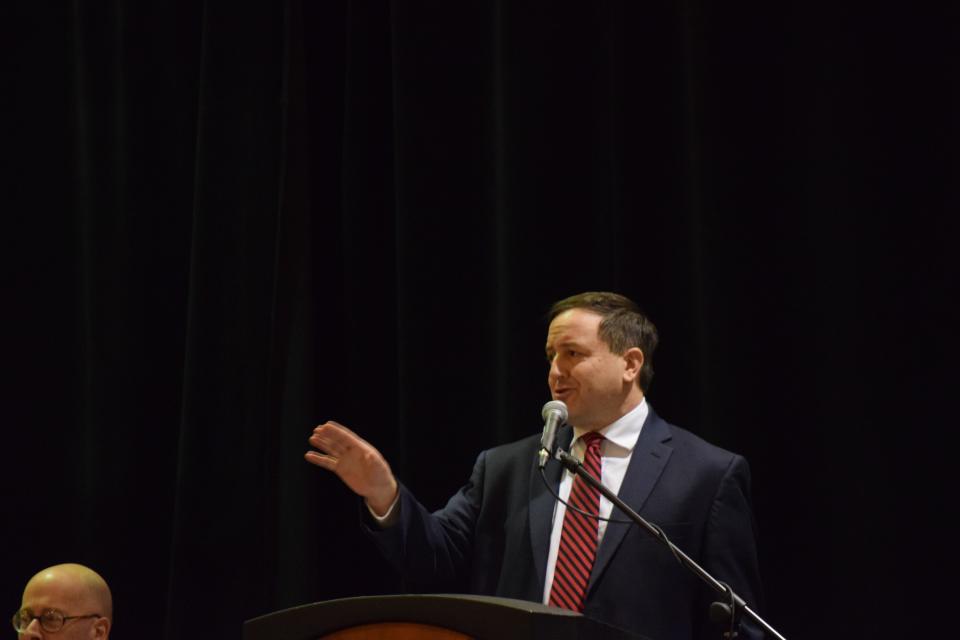
The Department of Justice is tasked with overseeing potential violations of the Americans with Disability Act, which requires those accessible voting machines be present at each polling place. If the clerk's office fails to comply, the DOJ can file a civil suit. The department monitored polls in 64 different jurisdictions across 24 states on Election Day, according to a Nov. 7 news release.
Thomas requested that Korsmeyer's office provide federal officials with the locations of voting machines, procedures relating to accessible voting machines, the specifications of those machines, and a "step-by-step detail" of how voters with disabilities can cast ballots in person. Korsmeyer alerted the secretary of state's office to the request, and "all that data" was sent to them shortly after, Ashcroft said.
A week later, on Nov. 3, Thomas replied to an email from Korsmeyer notifying the clerk that his office was working with the civil rights division of the DOJ, and that four DOJ staff would be visiting Cole County polling places on Election Day.
"Rest assured that we understand that you will be administering the election and we will try to minimize the time we spend at each site," Thomas wrote in the email, shared publicly by the Secretary of State's office on Nov. 6.
In a Twitter thread published on Nov. 6, Ashcroft, a Republican, wrote that Korsmeyer has "declined to allow this over-reach and the secretary of state's office fully supports him."
"While the U.S. DOJ could clearly learn a lot from Missouri about non-partisanship and how to administer accessible, secure and credible elections, it would be highly inappropriate for federal agents to violate the law by intimidating Missouri voters at the polls on Election Day," Ashcroft wrote.
Less than 24 hours before polls opened on Election Day, Ashcroft's office sent a news release announcing that he had met with the DOJ officials and told them "they did not have the authority, nor the jurisdiction" to monitor voting locations. He claimed the DOJ declined "to provide any clarification or actual documentation verifying such claims" of inaccessible polling places.
While the U.S. DOJ could clearly learn a lot from Missouri about non-partisanship and how to administer accessible, secure and credible elections, it would be highly inappropriate for federal agents to violate the law by intimidating Missouri voters at the polls on Election Day.
— Missouri SOS Office (@MissouriSOS) November 6, 2022
Both the U.S. Attorney's Office and Korsmeyer declined to comment, citing the ongoing investigation.
Ashcroft called the DOJ's reasoning for poll monitoring "disingenuous at best," and said he's filed Freedom of Information Act requests to the department to seek details on the complaints that prompted the investigation.
"I think it made it really clear that they weren't trying to fix a problem," Ashcroft said. "They wouldn't even tell us what the problem was."
He argued that the department should have notified them of the poll monitoring much earlier, and provided further detail when asked.
"Why did they sandbag us?" Ashcroft said. "Clearly they were not acting in good faith, and that's concerning. Everyone, when it comes to election administration, should be acting in good faith. Because when we don't, it causes people not to trust administration of elections."
David Kimball, a political science professor at the University of Missouri-St. Louis who studies election administration, said poll monitoring for disability concerns was "pretty standard practice for the Department of Justice." (In 2020, they sent monitors to 44 jurisdictions across the U.S.)
"In previous years, it happened without a problem," Kimball said. "Now we're at a political era where the Republican Party likes to stoke fear of the federal government." Kimball said.
Kimball referenced part of the new elections law that allows Ashcroft's office to audit county voter rolls, calling it "somewhat ironic" that he pushed for the measure allowing him "to micromanage county election offices in certain cases, but he doesn't want the Department of Justice watching over our elections."
Ashcroft said his office had not yet used that new authority, citing a "need to figure out exactly what the process would be for doing that."
Seen as a potential candidate for governor in 2024, Ashcroft been a vocal opponent of any federal involvement or presence in elections. He submitted a brief to the U.S. Supreme Court earlier this year in a key upcoming election law case, arguing for the need to "keep the federal government out of Missouri elections."
Police reports alleging harassment, intimidation filed against state representative in days before election
Two Columbia residents filed police reports against a state representative from the area in the days leading up to the election, claiming he made social media threats and intimidated them on social media.
In a police report filed Nov. 6 and obtained by the News-Leader, a Columbia woman told police that Rep. Chuck Basye, a Republican from Rocheport, had posted her full name and address on his public Facebook profile after the two of them interacted on the site.
The woman told police she started a conversation with Basye in a separate post about "tactical hammers," which she believed to be a joke about the recent assault on Speaker of the House Nancy Pelosi's husband and said was insensitive. Basye later posted a comment with her full name and home address, calling her "a liberal progressive that hates America."
She said she responded asking whether Basye posted "my address so that someone could hit me in the head with a hammer?" Basye responded "Bingo."
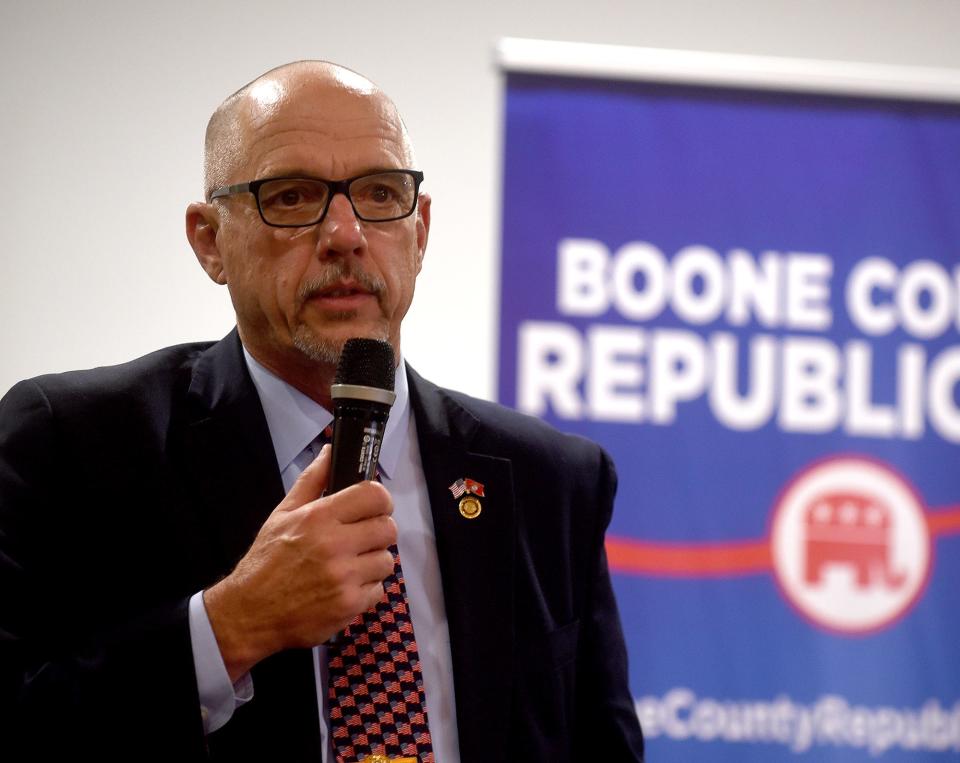
The woman told police she blocked Basye on Facebook and asked police not to contact the lawmaker, but "requested that the facts be documented." She said "she was scared that someone was going to assault her," but said she did not believe Basye intended to cause her harm. Police entered a residential security check for her home, provided her with safety information and closed the case.
In another report, also filed with Columbia police on Nov. 6, a separate woman told an officer a "report of a social media threat" was made. That case is still open.
More:Missouri lawmaker wants process to recall school board members, allow 'willful neglect' lawsuits
Basye, who is term-limited in the House and has served as chair of the committee for elementary and secondary education, called the reports "absolute 100% bull----," and said the woman from the former report "has been hassling me for years since I got elected."
"I got fed up with her bulls--- and I called her out on it," he said in a brief interview. "Her address is public record, as is everyone else's, you can find it going to the county website, so that's what I did. She took the bait and bit it.
"So it's absolute bulls---," he added. "She's a liar. She's always been a liar. All she is is a liberal intolerant hack. And that's all I'm going to say about it."
Basye is taking a new job in U.S. Rep. Blaine Luetkemeyer's office in January, he told a mid-Missouri radio station earlier this year.
Adrian Plank, a Democrat who won the election to represent Basye's altered district in Boone County, said his campaign noticed Basye's posts on Facebook and checked in the woman who had been interacting with him. He said he was "dumbfounded" by the posts, which he believed were a form of voter intimidation.
"We felt like she was probably okay at the time but you just don't know," Plank said. "You don't know how radical people have become in the last several years with the violent nature of politics. So you know, I was concerned about it."
County clerks, many new to the job, dealt with law changes, scrutiny
County clerks in Missouri were tasked with incorporating a bevy of changes to election administration ahead of the November midterms, and have faced rising outside scrutiny from election denial groups.
A sweeping new state law went into effect in late August, revamping key parts of Missouri's election process and infrastructure. Voters could now cast an in-person ballot early with no excuse for two weeks leading up to Election Day, and all voters had to present a valid form of government photo ID to cast their ballot.
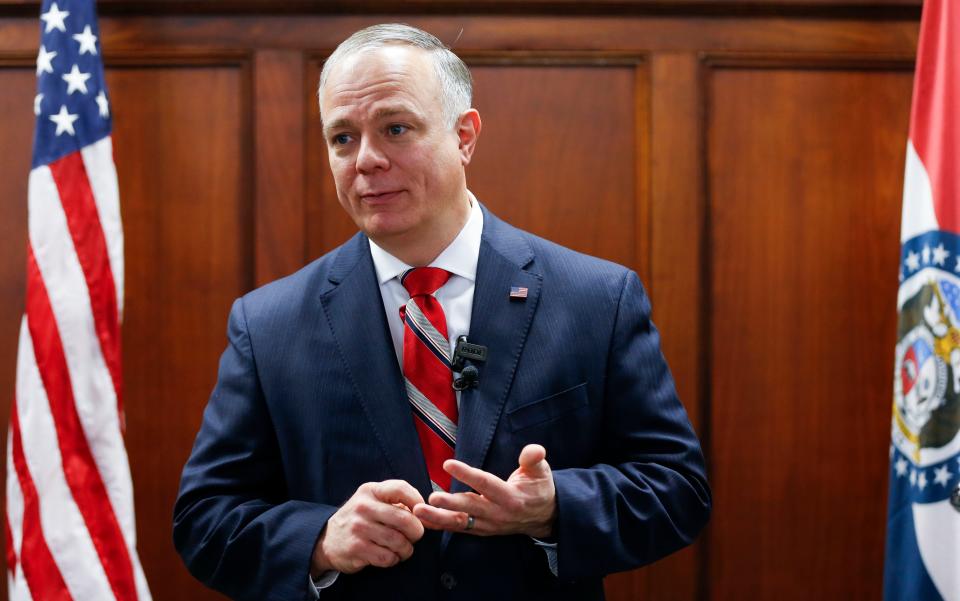
The November election's changes marked the second straight cycle in Missouri where significant changes have been in place; in 2020, mail-in voting was temporarily expanded due to COVID-19. Despite those changes, Greene County Clerk Shane Schoeller said in an interview that 2022's midterms "went really well."
"Back in 2018, that was a little bit more of a challenge, when you introduced that in the April election," Schoeller said, referencing a previous photo ID law that was in place before being struck down in court. "I was pleased with that aspect of it. And voters became more familiar with no-excuse absentee voting period, and that went really well, especially the second week as more voters became aware of that option."
For subscribers:New Missouri congressional map sends county clerks scrambling to prep for election
Ashcroft, who was a leading proponent of the new requirements, said that more provisional ballots were cast this year than in elections prior — a result of the new law that permits voters to cast one if they don't have a photo ID at the time of voting (they can later be verified by a signature match or if the voter returns with a photo ID). The "vast, vast majority" of those ballots ended up being counted according to early projections, Ashcroft said.
State officials won't be able to determine how much no-excuse absentee voting was used until election results are fully certified by local election authorities, Ashcroft said.
A number of the state's clerks were overseeing their first election this month — nearly a third of them were new to the job, the Jefferson City News Tribune reported. They enter an election environment that has grown more tense in recent years, as prominent elected officials and political figures who have spread conspiracy theories about the 2020 presidential election continued to do so about this year's midterms.
"We're continuing to see some folks that have that concern, but it's not the majority of voters by any stretch of the imagination," Schoeller said. "And I invite people who have those concerns, we want people to be informed. Contact us, let us have that conversation and make sure they have the information they're seeking."
Mike Lindell, one of the most prominent election conspiracists in the country, held a conference in Springfield earlier this year in which he and other speakers called on attendees to request numerous records from their county clerks' offices. Schoeller has filed a lawsuit in state court asking a judge to block requests for records he says could reveal the identity of voters and the candidates they cast their ballots for.
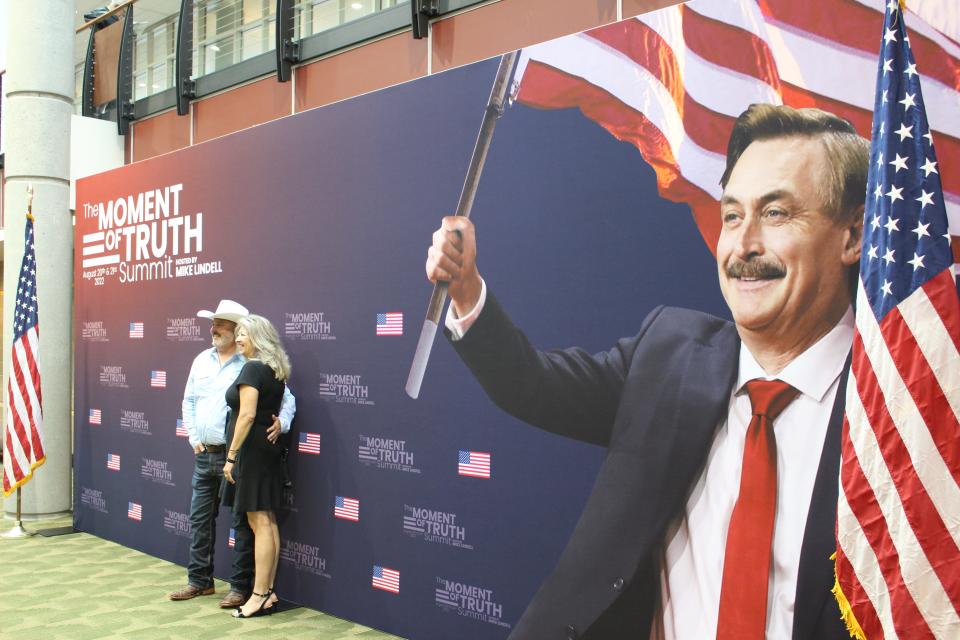
Another speaker at Lindell's conference specifically targeted the Missouri Association of County Clerks and Election Authorities. Linda Rantz, the co-organizer of the group Missouri Canvassers, floated unfounded theories that county clerks were being influenced at the association's annual conference by "government officials and NGO (nongovernmental organization) reps." (Kara Clark Summers, the Cape Girardeau County Clerk and president of the association, did not respond to requests for an interview.)
More:Greene County Clerk asks judge to rule on release of data sought by 2020 election deniers
"The clerks are not listening to us, and why is that?" Rantz said at the conference. "Look at how they're being influenced, being wined, dined and being told, 'Hey, you guys are great.'"
Election officials in Missouri have urged those skeptical or distrustful of election systems to come see the process for themselves.
"I think some election authorities have kind of pushed people off who had questions," Ashcroft argued. "And I think that's wrong. We serve the people. Frankly, I think, as a general rule, we should encourage citizens to have questions about their government."
Schoeller echoed similar sentiments to those he expressed immediately after Lindell's Springfield conference.
"Every part of an election, when it comes to tabulation equipment, accessible voting, Election Day — when they meet, it's bipartisan," Schoeller said. "I think when people understand that, and they realize what's in place before and after the election to ensure that when we do certify that outcome is accurate and correct, that gives them a great deal more confidence."
Galen Bacharier covers Missouri politics & government for the News-Leader. Contact him at gbacharier@news-leader.com, (573) 219-7440 or on Twitter @galenbacharier.
This article originally appeared on Springfield News-Leader: Few problems in MO midterm election despite DOJ drama, law changes

